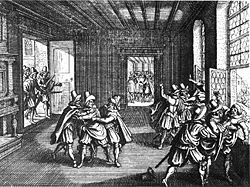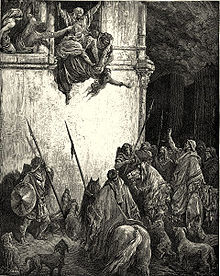- Defenestration
-
Defenestration is the act of throwing someone or something out of a window.[1] The term "defenestration" was coined around the time of an incident in Prague Castle in the year 1618. The word comes from the Latin de- (down or away from) and fenestra (window or opening).[2] Likewise, it can also refer to the condition of being thrown out of a window, as in The Defenestration of Ermintrude Inch.[3]
The act of defenestration connotes the forcible or peremptory removal of an adversary, and the term is sometimes used in just that sense;[4] it also suggests breaking the windows in the process (de- also means removal). Although defenestrations can be fatal due to the height of the window through which a person is thrown or throws oneself or due to lacerations from broken glass, the act of defenestration need not carry the intent or result of death.
Contents
Origin of the term
The term originates from two incidents in history, both occurring in Prague. In 1419, seven town officials were thrown from the Town Hall, precipitating the Hussite War. In 1618, two Imperial governors and their secretary were tossed from Prague Castle, sparking the Thirty Years War. These incidents, particularly in 1618, were referred to as the Defenestrations of Prague and gave rise to the term and the concept.
Notable defenestrations in history
See also: Category:Deaths by defenestrationHistorically, the word defenestration was used to refer to an act of political dissent. Notably, the Defenestrations of Prague in 1419 and 1618 helped to trigger prolonged conflict within Bohemia and beyond. It is said that some Catholics ascribed the survival of those defenestrated at Prague Castle in 1618 to divine intervention.
Other notable events in Prague's history include the defenestration of the Old-Town portreeve along with the bodies of seven murdered New-Town aldermen in 1483, and the death in 1948 of politician Jan Masaryk, whose body was found in the courtyard of the Foreign Ministry, below his bathroom window. A 2004 police investigation into his death concluded that, contrary to the initial ruling, he did not commit suicide, but was defenestrated, most likely by Czechoslovak Communists and their Soviet NKVD advisers for opposing the February 1948 Communist putsch.

- As recorded in the book of Kings II in the Bible, Jezebel was defenestrated at Jezreel by her own servants at the urging of Jehu. (2 Kings 9: 33)
- It has been suggested by several chronicles (notably the Annals of Westhide Abbey) that King John killed his nephew, Arthur of Brittany, by defenestration from the castle at Rouen, France, in 1203.
- In 1378, the crafts and their leader Wouter van der Leyden occupied the Leuven city hall. They took over the Leuven government. Most of the patricians left the city and fled to Aarschot. After negotiations between the parties, they agreed to share the government. The patricians did not accept this easily, as they lost their absolute power. Trying to turn the tide, they had Wouter van der Leyden assassinated in Brussels. The crafts wanted revenge. They handed over the patrician to a furious crowd. The crowd stormed the city hall and threw the patricians out of the window. At least 15 patricians were killed during this defenestration of Leuven.
- In 1383, Bishop Dom Martinho was defenestrated by the citizens of Lisbon, having been suspected of conspiring with the enemy when Lisbon was besieged by the Castilians.
- In 1452, King James II of Scotland murdered William Douglas, 8th Earl of Douglas, with his own hands and threw him out the window at Stirling Castle.
- On April 26, 1478, after the failure of the "Pazzi conspiracy" to murder the ruler of Florence, Lorenzo de' Medici, Jacopo de' Pazzi was defenestrated.
- In 1572, French King Charles IX's friend, the Huguenot leader Gaspard de Coligny, was killed in accordance with the wishes of Charles' mother, Catherine de' Medici. Charles had allegedly said "then kill them all that no man be left to reproach me." Thousands of Protestants were killed in the St. Bartholomew's Day massacre after soldiers attacked Coligny in his house, stabbed him, and threw him out the window.
- On the morning of December 1, 1640 in Lisbon, a group of supporters of the Duke of Braganza party found Miguel de Vasconcelos, the hated Portuguese Secretary of State of the Habsburg Philip III, hidden in a closet, killed him and defenestrated him. His corpse was left to the public outrage.
- The Revolutions of 1848 led to unrest in the German states. When an agitated crowd forced their way into the town hall in Cologne on March 3, two city councillors panicked and jumped out of the window; one of them broke both his legs. The event went down in the city’s history as the "Cologne Defenestration"[citation needed].
- During the Polish January 1863 Uprising, Russian troops threw Frédéric Chopin's piano out of a second-story apartment. The incident was famously memorialized in Polish poet Cyprian Norwid's poem, "Chopin's Piano." The composer had left Warsaw and Poland forever shortly before the outbreak of the November 1830 Uprising.
- On June 11, 1903, a group of Serbian army officers murdered and defenestrated King Alexander and Queen Draga.
- In 1911, during the Triangle Shirtwaist Factory fire, numerous fatalities were people who leapt or fell out of windows to their death.
- In 1922, Italian politician and writer Gabriele d'Annunzio was temporarily crippled after being pushed out a window by an unknown assailant.
- On March 10, 1948, the Czechoslovakian minister of foreign affairs Jan Masaryk was found dead, dressed in his pajamas, in the courtyard of the Foreign Ministry below his bathroom window. The initial investigation stated that he committed suicide by jumping out of the window, although some believe that he was murdered by the ascendant Communists (see Czech coup). The newest criminal investigation deduced from the trajectory of Masaryk's fall that he was thrown out of the window.
- On November 28, 1953 the U.S. biological warfare specialist Frank Olson fell through a window in what may have been an assassination.
- In 1968, the son of China's former paramount leader Deng Xiaoping, Deng Pufang, was thrown from a window by Red Guards during the Cultural Revolution.
- Shortly before midnight on December 15, 1969, the Italian anarchist Giuseppe Pinelli was seen falling to his death from a fourth floor window of the Milan police station.
- In 1977, as a result of political backlash against his album Zombie Fela Kuti's mother was thrown from a window during a military raid on his compound, the Kalakuta Republic by 1,000 Nigerian soldiers. The injuries sustained from the fall led to her death days later. In addition, the commanding officer defecated on her head, while the soldiers burned down the compound, destroying his musical equipment, studio and master tapes, and jailing him for being a subversive. [5]
- In 1993, Toronto lawyer Garry Hoy fell to his death after attempting to demonstrate the strength of his office tower's windows.
- The 2000 Ramallah lynching included throwing the (already-dead) body of either Vadim Nurzhitz or Yossi Avrahami out of a second-floor window, after those two Israeli soldiers had been lynched.
- On September 11, 2001, the September 11 attacks caused over 200 people to jump or fall from windows, to die by falling rather than from the fires inside the World Trade Center buildings.[6] Some of the falls were broadcast on the news.
- On March 2, 2007, Russian investigative journalist Ivan Safronov, who was researching the Kremlin's covert arms deals, fell to his death from a fifth floor window. Friends and colleagues discount suicide as a reason and an investigation was opened looking into possible "incitement to suicide".[7]
- In 2007 in Gaza, Hamas killed a Fatah supporter by defenestration, an act repeated the next day when a Hamas supporter was defenestrated by Fatah.[8]
- In 2009, the Malaysian Anti-Corruption Commission held several witnesses overnight for questioning. One witness, Teoh Beng Hock, was found dead on the roof of an adjacent building. Public outrage led to the formation of a Royal Commission of Inquiry which is ongoing. In April 2011, a Customs officer under investigation was found dead outside an MACC office.
Scientific studies
In 1942, safety pioneer Hugh DeHaven published the classic Mechanical analysis of survival in falls from heights of fifty to one hundred and fifty feet.[9] DeHaven's work on survival in defenestrations was instrumental in the development of the seat belt.[clarification needed]
Self-defenestration (jumping out of a window)
Self-defenestration (autodefenestration) is the act of jumping, propelling oneself, or causing oneself to fall, out of a window. This phenomenon played a notable role in such events as the Triangle Shirtwaist fire, 9/11, and other disasters; it is also a method of suicide.
There is also an urban legend that Wall Street investors autodefenestrated during the 1929 stock market crash.[10]
In the United States, self-defenestration is among the least common methods of committing suicide (typically less than 2% of all reported suicides in the United States for 2005).[11]
In Hong Kong, jumping is the most common method (from any location) of committing suicide, accounting for 52.1% of all reported suicide cases in 2006, and similar rates for the years prior to that.[12] The Centre for Suicide Research and Prevention of the University of Hong Kong believes that it may be due to the abundance of easily accessible high-rise buildings in Hong Kong (implying that much of the jumping is out of windows or from roof tops).[13]
In literature
In his poem Defenestration, R.P. Lister wrote with amusement over the creation of so exalted a word for so basic a concept. The poem narrates the thoughts of a philosopher undergoing defenestration. As he falls, the philosopher considers why there should be a particular word for the experience, when many equally simple concepts don't have specific names. In an evidently ironic commentary on the word, Lister has the philosopher summarize his thoughts with, "I concluded that the incidence of logodaedaly was purely adventitious."[14][15]
References
- ^ Oxford English Dictionary
- ^ Douglas Harper (2001). "defenestration". Online Etymological Dictionary. http://www.etymonline.com/index.php?term=defenestration.
- ^ Arthur C. Clarke; Tales from the White Hart, Ballantine Books, 1957
- ^ Caracas Metromayor’s ‘Political Defenestration’
- ^ Matthew McKinnon (August 12, 2005). "Rebel Yells: A protest music mixtape". Canadian Broadcasting Corporation. http://www.cbc.ca/arts/photoessay/protest/index14.html. Retrieved 2009-11-22.
- ^ Cauchon, Dennis and Martha Moore (September 2, 2002). "Desperation forced a horrific decision". USATODAY. http://www.usatoday.com/news/sept11/2002-09-02-jumper_x.htm. Retrieved 2006-09-09.
- ^ Claims of 'incitement to suicide' after journalist falls to his death
- ^ Palestinian gunmen target Haniyeh's home in Gaza, Associated Press, 11/06/2007 [1]
- ^ DeHaven H (March 2000). "Mechanical analysis of survival in falls from heights of fifty to one hundred and fifty feet*". Inj. Prev. 6 (1): 62–8. doi:10.1136/ip.6.1.62-b. PMC 1730592. PMID 10728546. http://ip.bmj.com/cgi/pmidlookup?view=long&pmid=10728546.
- ^ After the 1929 stock market crash, did investors really jump out of windows?
- ^ "WISQARS Leading Causes of Death Reports". http://webappa.cdc.gov/sasweb/ncipc/leadcaus10.html. Retrieved 2009-07-06.
- ^ "Method Used in Completed Suicide". HKJC Centre for Suicide Research and Prevention, University of Hong Kong. 2006. http://csrp.hku.hk/WEB/eng/statistics.asp#3. Retrieved 2009-09-10.
- ^ "遭家人責罵:掛住上網媾女唔讀書 成績跌出三甲 中四生跳樓亡". Apple Daily. 9 August. http://hk.apple.nextmedia.com/template/apple/art_main.php?iss_id=20090809&sec_id=4104&subsec=12731&art_id=13078710. Retrieved 2009-09-10.
- ^ R. P. Lister; Defenestration; The New Yorker, 16 September 1956.
- ^ J. M. Cohen (Ed.); Yet more comic and curious verse; Penguin Books (1959)
Categories:- Execution methods
- Suicide methods
- Windows
Wikimedia Foundation. 2010.


